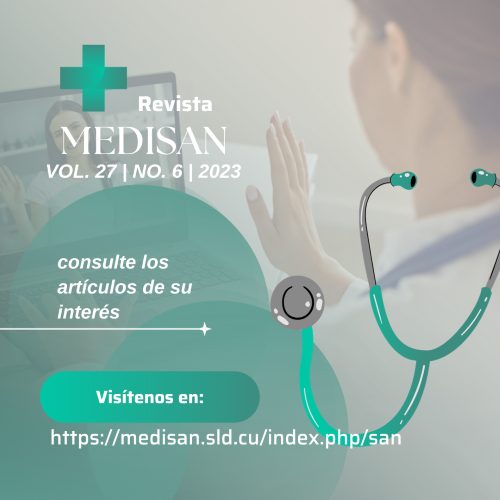Risk factors related to postcovid–19 syndrome in residents from Pinar del Río
Keywords:
covid-19, postcovid-19 syndrome, risk factors, epidemic, cases and controls studies.Abstract
Introduction: The possibilities to suffer from the postcovid-19 syndrome grow as the pandemic expands.
Objective: To identify the risk factors related to the postcovid-19 syndrome in residents from Pinar del Río.
Methods: A cases and controls study that included covid-19 convalescents was carried out. They were assisted in the multidisciplinary service of Luis Augusto Turcios Lima Polyclinic of Pinar del Rio province during 2022 that were included in 2 groups at random, at a ratio of 1:2 (100 cases and 200 controls). The statistical analysis was based on an univaried strategy, for which the odds ratio was determined for each risk factor and the confidence intervals were considered at 95 %, as well as the chi-square test, with a significance level of p<0,05.
Results: In the study there was a prevalence of the female sex, diabetes mellitus, pharmacological treatment, ventilation support, the presence of established sequels and complications.
Conclusions: In spite of identifying the most frequent risk factors related to the postcovid-19 syndrome, it is still a challenge for health professionals.
Downloads
References
2. Venkatesan P. NICE guideline on Long COVID. Lancet Res Med. 2021 [citado 06/12/2022];9(2):129. Disponible en: https://doi.org/10.1016/S2213-2600(21)00031-X
3. Jacobson KB, Rao M, Bonilla H, Subramanian A, Hack I, Madrigal M, et al. Patients with uncomplicated coronavirus disease 2019 (COVID-19) have long-term persistent symptoms and functional impairment similar to patients with severe COVID-19: A Cautionary Tale during a Global Pandemic. Clin Infec Dis. 2021 [citado 06/12/2022];73(3). Disponible en: https://doi.org/10.1093/cid/ciab103
4. Halpin S, O'Connor R, Sivan M. Long COVID and chronic COVID syndromes. J Med Virol. 2021 [citado 06/12/2022];93(3):1242-3. Disponible en: https://onlinelibrary.wiley.com/doi/10.1002/jmv.26587
5. Garg P, Arora U, Kumar A, Wig N. The “post-COVID” syndrome: How deep is the damage? J Med Virol. 2021 [citado 06/12/2022];93(2):673-4. Disponible en: https://onlinelibrary.wiley.com/doi/10.1002/jmv.26465
6. Willi S, Lüthold R, Hunt A, Hänggi NV, Sejdiu D, Scaff C, et al. COVID-19 squealed in adults aged less than 50 years: A systematic review. Travel Med Infec Dis. 2021 [citado 06/12/2022];40. Disponible en: https://doi.org/10.1016/j.tmaid.2021.101995
7. Baig AM. Chronic COVID syndrome: Need for an appropriate medical terminology for long COVID and COVID long‐haulers. J Med Virol. 2021 [citado 06/12/2022];93(5):2555‐ 6. Disponible en: https://doi.org/10.1002/jmv.26624
8. Fernández de las Peñas C, Palacios Ceña D, Gómez Mayordomo V, Cuadrado ML, Florencio LL. Defining post-COVID symptoms (post-acute COVID, long COVID, persistent postCOVID): an integrative classification. Int J Environ Res Public Health. 2021 [citado 06/12/2022];18(5):2621. Disponible en: https://doi.org/10.3390/ijerph18052621
9. Oronsky B, Larson Ch, Hammond TC, Oronsky A, Kesari S, Lybeck M, et al. Review of Persistent Post-COVID Syndrome (PPCS). Clinic Rev Allerg Immunol. 2023 [citado 06/12/2022];64(1):66–74. Disponible en: https://link.springer.com/article/10.1007/s12016-021-08848-3
10. Vanichkachorn G, Newcomb R, Cowl CT, Murad MH, Breeher L, Miller S, et al. Post COVID-19 Syndrome (Long Haul Syndrome): Description of a multidisciplinary Clinic at the Mayo Clinic and characteristics of the initial patient cohort. Mayo Clinc Proc. 2021 [citado 06/12/2022];96(7). Disponible en: https://www.mayoclinicproceedings.org/article/S0025-6196(21)00356-6/fulltext
11. López León S, Wegman Ostrosky T, Perelman C, Sepulveda R, Rebolledo PA, Cuapio A, et al. More than 50 long-term effects of COVID-19 a systematic review and meta-analysis. Sci Rep. 2021 [citado 06/12/2022];11(1). Disponible en: https://doi.org/10.1101/2021.01.27.21250617
12. Galal I, Hussein AARM, Amin MT, Saad MM, Zayan HEE, Abdelsayed MZ, et al. Determinants of persistent post-COVID-19 symptoms: value of a novel COVID-19 symptom score. Egypt J Bronchol 2021 [citado 06/12/2022];15(1):10. Disponible en: https://ejb.springeropen.com/articles/10.1186/s43168-020-00049-4
13. Oronsky B, Larson C, Hammond TC, Oronsky A, Kesari S, Lybeck M, et al. A review of persistent post‑COVID syndrome (PPCS). Clin Rev Allergy Immunol. 2023 [citado 06/12/2022];64(1). Disponible en: https://doi.org/10.1007/s12016-021-08848-3
14. Saltos Bazurto G, Hernández Castro M, Sánchez Núñez D, Bravo Cedeño I. Análisis de las complicaciones post-COVID-19 en pacientes con enfermedades crónicas no trasmisibles. Higía. 2020 [citado 06/12/2022];3(2). Disponible en: https://revistas.itsup.edu.ec/index.php/Higia/article/view/467
15. Brito Zerón P, Conangla Ferrín L, Kostov B, Moragas Moreno A, Ramos Casals M,
Sequeira Aymar E, et al. Manifestaciones persistentes de la CIOVID 19. Guía de práctica clínica. Madrid: Sociedad Catalana de Medicina Familiar y Comunitaria; 2020 [citado 06/12/2022]. Disponible en: https://www.semfyc.es/wp-content/uploads/2021/12/04-Covid19-persistente.pdf
16. Sociedad Española de Médicos Generales y de Familia. Guía clínica para la atención al paciente Long COVID/COVID persistente. Madrid: SEMG; 2020 [citado 06/12/2022]. Disponible en: https://www.semg.es/index.php/consensos-guias-y-protocolos/363-guia-clinica-para-laatencion-al-paciente-long-covid-covid-persistente
17. Venkatesan P. NICE guideline on long COVID. Lancet Respir Med. 2021 [citado 06/12/2022];9(2):129. Disponible en: https://doi.org/10.1016/S2213-2600(21)00031-X
18. Sociedad Española de Directivos de la Salud. Documento para la atención integral al paciente post-COVID. Madrid: SEDISA; 2020 [citado 06/12/2022]. Disponible en: https://seom.org/images/Documento_Atencion_Integral_PostCovid.pdf
19. National Institute for Health and Care Excellence. COVID-19 rapid guideline: managing the long-term effects of COVID-19. London: NICE; 2020 [citado 06/12/2022]. Disponible en: https://www.ncbi.nlm.nih.gov/books/NBK567261/
20. Carod Artal FJ. Síndrome post-COVID-19: epidemiología, criterios diagnósticos y mecanismos patogénicos implicados. Rev Neurol. 2021 [citado 06/12/2022];72(11):384-96. Disponible en: https://neurologia.com/articulo/2021230
Published
How to Cite
Issue
Section
License
All the articles can be downloaded or read for free. The journal does not charge any amount of money to the authors for the reception, edition or the publication of the articles, making the whole process completely free. Medisan has no embargo period and it is published under the license of Creative Commons, International Non Commercial Recognition 4.0, which authorizes the copy, reproduction and the total or partial distribution of the articles in any format or platform, with the conditions of citing the source of information and not to be used for profitable purposes.





